shakespeare(sonnet) 英国文学 十四行诗
十四行诗 Sonnet 18
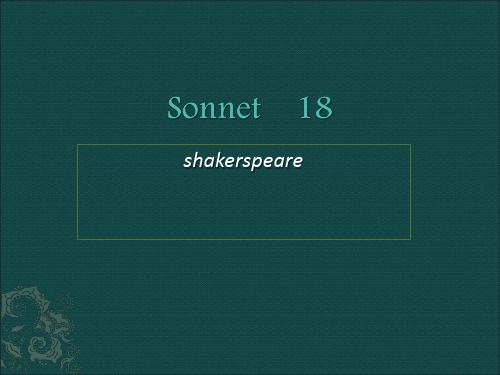
我能否将你比作夏天? 你比夏天更美丽温婉。 狂风将五月的蓓蕾凋残, 夏日的勾留何其短暂。 休恋那丽日当空, 转眼会云雾迷蒙。 休叹那百花飘零, 催折于无常的天命。 唯有你永恒的夏日常新, 你的美貌亦毫发无损。 死神也无缘将你幽禁, 你在我永恒的诗中长存。 只要世间尚有人吟诵我的诗篇, 这诗就将不朽,永葆你的芳颜。
shakerspeare
shakespeare: 威廉· 莎士比亚(William Shakespeare,1564-1616) 是欧洲文艺复兴时期英国最 重要的作家,杰出的戏剧家 和诗人,他创作了大量脍炙 人口的文学作品,在欧洲文 学史上占有特殊的地位,被 喻为“人类文学奥林匹克山 上的宙斯”。 他亦跟古希腊 三大悲剧家埃斯库罗斯 (Aeschylus)、索福克里斯 (Sophocles)及欧里庇得斯 (Euripides)合称戏剧史上四大 悲剧家
第一节(1-4) 起
第二节(5-8)承
第三节(9-12)转
第四节(13-14)合
ቤተ መጻሕፍቲ ባይዱ
十四行诗之十八以问句开篇,“我可将你比作夏天?”(shall I compare thee to a summer’s day ?)将使人比作英国气候最宜人的夏季, 通俗自然,让人耳目一新。然后再自答“你比夏天更可爱,也更温 婉。”诗人对朋友的珍爱之情跃然纸上,原因在于:狂风会把五月娇 嫩的花蕾摧残,夏天延迟的时间又过于短暂。这二句胃下面铺垫。以 上四句是诗的第一节,此为起。 诗人接着解释道,天上的眼睛有时发出灼热的亮光,他金色的容颜又 遭到乌云遮挡;无论是偶然原因或者是必然的变化,一切美好的事物 总会凋零,此为承。
在第三节,诗人从天道变化,时光的易逝的感叹转向对朋友青春和美 貌的直接赞颂。“可是啊,你永恒的夏天不会消逝,你娇美的容颜啊, 永远不会年老色衰,就连死神也无法夸口你在她的阴影里徘徊,你会 在不朽的诗行里与时间同在。”此为转。诗人赞颂朋友的青春美貌闭 夏天,比时间更能持久而永恒。
莎士比亚十四行诗简介

莎士比亚十四行诗简介一、莎士比亚十四行诗的背景概述莎士比亚(William Shakespeare)是英国文艺复兴时期最重要的戏剧作家之一,他以其深邃的思想和丰富多样的作品而闻名于世。
莎士比亚的作品跨越了戏剧、诗歌和散文,而他的十四行诗则是他众多作品中的一颗璀璨之星。
二、莎士比亚十四行诗的特点莎士比亚的十四行诗是以英语诗歌中最常见的格式之一——抒情诗(Sonnet)的形式创作而成。
一首完整的十四行诗由14个诗行组成,按一定的韵律和押韵规则编排。
莎士比亚的十四行诗特点主要体现在以下几个方面:1. 韵律和押韵规则莎士比亚的十四行诗是按照特定的韵律和押韵规则编写的。
每个诗行包含10个音节,通常被称为“五音步(pentameter)”。
而整首诗的押韵规则则是“ABABCDCDEFEFGG”。
这种规则的押韵方式增加了诗歌的韵律感,使诗歌更加优美动人。
2. 内容和主题莎士比亚的十四行诗内容多样,主题涵盖了爱情、时间、死亡、自然等多个方面。
他以细腻的情感和深刻的思考,表现了人类的喜怒哀乐,揭示了人性的复杂性和命运的无常。
他的十四行诗既有对美好事物的赞美,也有对世俗现实的讽刺和嘲笑。
3. 诗歌结构和语言运用莎士比亚的十四行诗通常分为四个部分:第一部分是前八行,称为“抒情部分(the octave)”,主要表达诗人的疑问、思索或者赞美;第二部分是后六行,称为“总结部分(the sestet)”,用来回答前八行所提出的问题或做出总结性的陈述。
此外,莎士比亚的诗歌运用了丰富的修辞手法,包括比喻、拟人、夸张等,使诗歌显得生动有趣,能够吸引读者的注意力。
三、莎士比亚十四行诗的代表作品莎士比亚的十四行诗中,有几首作品被认为是他最杰出的代表作。
以下是其中几首代表作的简要介绍:1. 《两个城堡之战》这首诗是莎士比亚最著名的十四行诗之一,描述了两个城堡之间的战斗。
诗中抒发了作者对战争的憎恶以及对和平的向往。
2. 《时间的折磨》这首诗通过描绘时间对人的摧残和无情,表达了作者对时间流逝的焦虑和无奈。
莎士比亚154首十四行诗
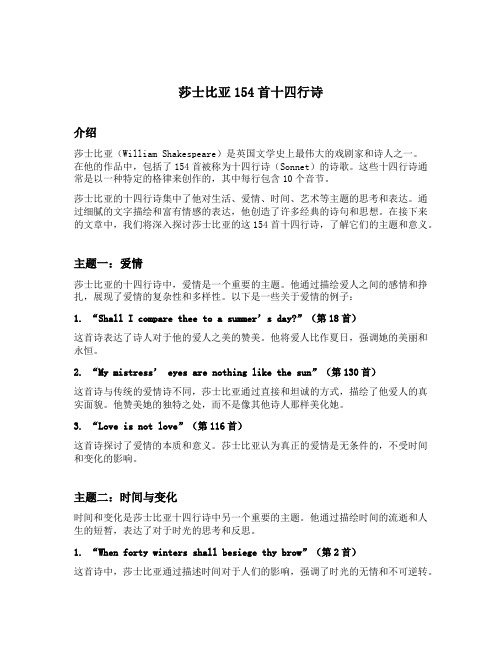
莎士比亚154首十四行诗介绍莎士比亚(William Shakespeare)是英国文学史上最伟大的戏剧家和诗人之一。
在他的作品中,包括了154首被称为十四行诗(Sonnet)的诗歌。
这些十四行诗通常是以一种特定的格律来创作的,其中每行包含10个音节。
莎士比亚的十四行诗集中了他对生活、爱情、时间、艺术等主题的思考和表达。
通过细腻的文字描绘和富有情感的表达,他创造了许多经典的诗句和思想。
在接下来的文章中,我们将深入探讨莎士比亚的这154首十四行诗,了解它们的主题和意义。
主题一:爱情莎士比亚的十四行诗中,爱情是一个重要的主题。
他通过描绘爱人之间的感情和挣扎,展现了爱情的复杂性和多样性。
以下是一些关于爱情的例子:1. “Shall I compare thee to a summer’s day?”(第18首)这首诗表达了诗人对于他的爱人之美的赞美。
他将爱人比作夏日,强调她的美丽和永恒。
2. “My mistress’ eyes are nothing like the sun”(第130首)这首诗与传统的爱情诗不同,莎士比亚通过直接和坦诚的方式,描绘了他爱人的真实面貌。
他赞美她的独特之处,而不是像其他诗人那样美化她。
3. “Love is not love”(第116首)这首诗探讨了爱情的本质和意义。
莎士比亚认为真正的爱情是无条件的,不受时间和变化的影响。
主题二:时间与变化时间和变化是莎士比亚十四行诗中另一个重要的主题。
他通过描绘时间的流逝和人生的短暂,表达了对于时光的思考和反思。
1. “When forty winters shall besiege thy brow”(第2首)这首诗中,莎士比亚通过描述时间对于人们的影响,强调了时光的无情和不可逆转。
2. “So sweet and lovely doth thy time make haste” (第60首)这首诗表达了莎士比亚对于时间的流逝的感叹。
莎士比亚sonnet106及其翻译
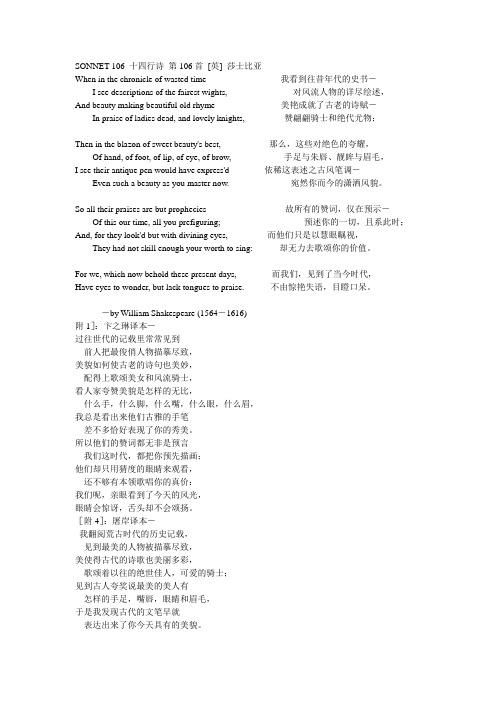
SONNET 106 十四行诗第106首[英] 莎士比亚When in the chronicle of wasted time 我看到往昔年代的史书-I see descriptions of the fairest wights, 对风流人物的详尽绘述,And beauty making beautiful old rhyme 美艳成就了古老的诗赋-In praise of ladies dead, and lovely knights, 赞翩翩骑士和绝代尤物;Then in the blazon of sweet beauty's best, 那么,这些对绝色的夸耀,Of hand, of foot, of lip, of eye, of brow, 手足与朱唇、靓眸与眉毛,I see their antique pen would have express'd 依稀这表述之古风笔调-Even such a beauty as you master now. 宛然你而今的潇洒风貌。
So all their praises are but prophecies 故所有的赞词,仅在预示-Of this our time, all you prefiguring; 预述你的一切,且系此时;And, for they look'd but with divining eyes, 而他们只是以慧眼瞩视,They had not skill enough your worth to sing: 却无力去歌颂你的价值。
For we, which now behold these present days, 而我们,见到了当今时代,Have eyes to wonder, but lack tongues to praise. 不由惊艳失语,目瞪口呆。
-by William Shakespeare (1564-1616)附1]:卞之琳译本-过往世代的记载里常常见到前人把最俊俏人物描摹尽致,美貌如何使古老的诗句也美妙,配得上歌颂美女和风流骑士,看人家夸赞美貌是怎样的无比,什么手,什么脚,什么嘴,什么眼,什么眉,我总是看出来他们古雅的手笔差不多恰好表现了你的秀美。
Sonnet18(屠岸)
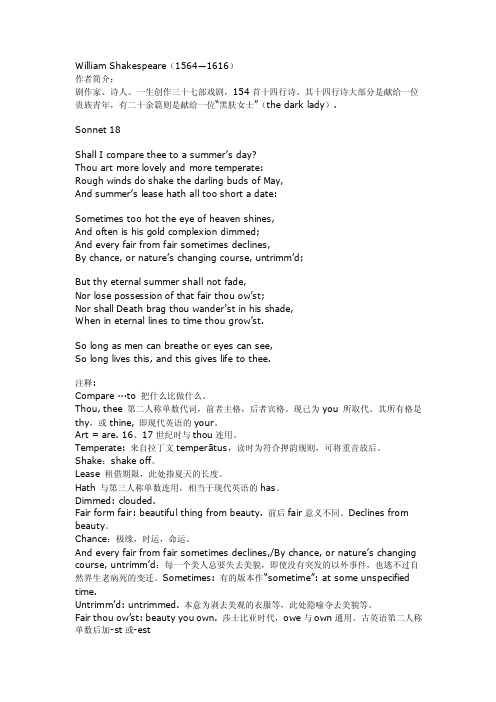
William Shakespeare(1564—1616)作者简介:剧作家、诗人。
一生创作三十七部戏剧,154首十四行诗。
其十四行诗大部分是献给一位贵族青年,有二十余篇则是献给一位“黑肤女士”(the dark lady).Sonnet 18Shall I compare thee to a summer’s day?Thou art more lovely and more temperate:Rough winds do shake the darling buds of May,A nd summer’s lease hath all too short a date:Sometimes too hot the eye of heaven shines,And often is his gold complexion dimmed;And every fair from fair sometimes declines,By chance, or nature’s changing course, untrimm’d;But thy eternal summer shall not fade,Nor lose possession of that fair thou ow’st;Nor shall Death brag thou wander’st in his shade,When in eternal lines to time thou grow’st.So long as men can breathe or eyes can see,So long lives this, and this gives life to thee.注释:Compare ···to 把什么比做什么。
Thou, thee 第二人称单数代词,前者主格,后者宾格。
现已为you 所取代。
英国十四行诗

英国十四行诗英国十四行诗是一种诗歌形式,源于意大利十四行诗(sonnet)的传统。
这种诗形最早在14世纪由意大利诗人彼得拉克创造,并在16世纪由英国诗人威廉·莎士比亚引入英国。
英国十四行诗通常由14行组成,分为四个四行节(四联)和一个两行节(双联)。
这个结构被称为“四联夫斯坦扎”(quatrains)和“双联夫斯坦扎”(couplet)。
每个四联夫斯坦扎的韵脚模式通常是押韵方式为ABAB,而双联夫斯坦扎的韵脚模式通常是CC。
这种结构使得英国十四行诗在形式上具有一定的规范性和统一性。
英国十四行诗的内容可以涵盖各种主题,包括爱情、自然、宗教、政治等。
莎士比亚的十四行诗被广泛认为是最具代表性的英国十四行诗之一。
他的十四行诗以其深刻的洞察力、感情的表达和优美的语言而闻名。
莎士比亚的十四行诗通常以爱情为主题,探讨了爱情的各个方面,包括欲望、失望、忠诚和不可避免的死亡。
除了莎士比亚,其他英国诗人也创作了许多优秀的十四行诗。
例如,约翰·米尔顿的诗集《失乐园》中包含了一些具有政治和宗教意义的十四行诗。
米尔顿的十四行诗以其复杂的结构和丰富的象征主义而著称。
另外,伊丽莎白时代的诗人埃德蒙·斯宾塞也以他的十四行诗集《仙后》而闻名。
斯宾塞的十四行诗以其浪漫的描写和富有想象力的语言而受到赞赏。
总而言之,英国十四行诗是一种形式严谨、内容丰富的诗歌形式。
它在英国文学史上占据着重要地位,被广泛认为是英国文学的经典之作。
无论是莎士比亚的爱情诗,还是米尔顿的政治诗,英国十四行诗都展示了诗人们对人类情感和人生意义的深刻思考。
莎士比亚十四行诗翻译和解读
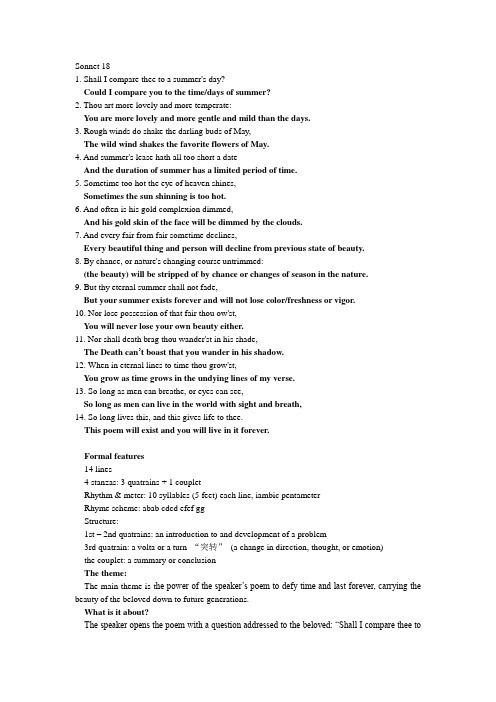
Sonnet 181. Shall I compare thee to a summer's day?Could I compare you to the time/days of summer?2. Thou art more lovely and more temperate:You are more lovely and more gentle and mild than the days.3. Rough winds do shake the darling buds of May,The wild wind shakes the favorite flowers of May.4. And summer's lease hath all too short a dateAnd the duration of summer has a limited period of time.5. Sometime too hot the eye of heaven shines,Sometimes the sun shinning is too hot.6. And often is his gold complexion dimmed,And his gold skin of the face will be dimmed by the clouds.7. And every fair from fair sometime declines,Every beautiful thing and person will decline from previous state of beauty.8. By chance, or nature's changing course untrimmed:(the beauty) will be stripped of by chance or changes of season in the nature.9. But thy eternal summer shall not fade,But your summer exists forever and will not lose color/freshness or vigor.10. Nor lose possession of that fair thou ow'st,You will never lose your own beauty either.11. Nor shall death brag thou wander'st in his shade,The Death can’t boast that you wander in his shadow.12. When in eternal lines to time thou grow'st,You grow as time grows in the undying lines of my verse.13. So long as men can breathe, or eyes can see,So long as men can live in the world with sight and breath,14. So long lives this, and this gives life to thee.This poem will exist and you will live in it forever.Formal features14 lines4 stanzas: 3 quatrains + 1 coupletRhythm & meter: 10 syllables (5 feet) each line, iambic pentameterRhyme scheme: abab cdcd efef ggStructure:1st – 2nd quatrains: an introduction to and development of a problem3rd quatrain: a volta or a turn “突转”(a change in direction, thought, or emotion)the couplet: a summary or conclusionThe theme:The main theme is t he power of the speaker’s poem to defy time and last forever, carrying the beauty of the beloved down to future generations.What is it about?The speaker opens the poem with a question addressed to the beloved: “Shall I compare thee toa summer’s day?” The next eleven lines are devoted to such a comparison. Summer: (Line 3: rough winds;4:too short;5. too hot;6. too dimmed;7&8. beautiful things will die) Sonnet 18 is the first poem in the sonnets not to explicitly encourage the young man to have children. The “procreation” sequence of the first 17 sonnets ended with the speaker’s realization that the young man might not need children to preserve his beauty; he could also live forever in this poem.Figures of speechIn line (5 ) There is a Metaphor .In line ( 5+6 ) There is a Personification .( eye of Heaven shines ) : Eye of heaven = the sunThe sun became dark because dark of clouds .In Line (9+10+12 ) There is a Hyperbole .In Line ( 11 )There is a personification .In Line ( 14 ) There is an Inverted order .Analysis: (拓展)The poem works at a rather curious level of achieving its objective through dispraise.The summer's day is found to be lacking in so many respects (too short, too hot, too rough, and sometimes too dingy), but curiously enough one is left with the abiding impression that 'the lovely boy' is in fact like a summer's day at its best, fair, warm, sunny, temperate, one of the darling buds of May, and that all his beauty has been wonderfully highlighted by the comparison.Sonnet 1301. My mistress' eyes are nothing like the sun;My lady’s eyes aren’t like the sun at all.2. Coral is far more red, than her lips red:Coral is much redder than her lips.3. If snow be white, why then her breasts are dun;If snow is white, then her breasts are brown.4. If hairs be wires, black wires grow on her head.If hair is as coarse as threads, then her hair is full of black threads.5. I have seen roses damasked, red and white,I have seen the pinkish, red and white roses.6. But no such roses see I in her cheeks;But I can see such kinds of roses in her cheeks.7. And in some perfumes is there more delightThere is much tempting/attractive fragrance.8. Than in the breath that from my mistress reeks.The fragrance is more attractive than her steamy, sweaty and unsavory smells.9. I love to hear her speak, yet well I knowI like listening to her speaking, but I am also aware that10. That music hath a far more pleasing sound:The sound of music is much more favorable than her sound.11. I grant I never saw a goddess go,I admit that I never saw a goddess walking by.12. My mistress, when she walks, treads on the ground:My mistress stamps on the floor when she walks.13. And yet by heaven, I think my love as rare,But I can swear to God that my lover is as precious as15. As any she belied with false compare.As any woman who has been misrepresented by ridiculous comparisons.Formal features14 lines4 stanzas: 3 quatrains + 1 coupletRhythm & meter: 10 syllables (5 feet) each line, iambic pentameterRhyme scheme: abab cdcd efef ggStructure:1st – 2nd quatrains: an introduction to and development of a problem3rd quatrain: a volta or a turn “突转”(a change in direction, thought, or emotion)the couplet: a summary or conclusionThemeThe poet suggests their love is rare because he does not desire her to be something she is not.It's about finding love in spite of (or maybe even because of) physical flaws.It pokes fun at our obsession with looks and to show how ridiculous it is to ask any person to live up to some ideal of perfect beauty.Figures of speechNegative similesSimile may also be expressed in the negative form“My mistress’ eyes are nothing like the sun”Etc.Ironic toneThe sonnet appears to be humorous, but the couplet displays the deeply romantic tone of the poem.Analysis(拓展)In many ways, Shakespeare’s sonnets subvert and reverse the conventions of the Petrarchan love sequence: the idealizing love poems, for instance, are written not to a perfect woman but to an admittedly imperfect man, and the love poems to the dark lady are anything but idealizing, like this one. He describes the woman that he loves in extremely unflattering terms but claims that he truly loves her, which lends credibility to his claim because even though he does not find her attractive, he still declares his love for her.Sonnet 1291. The expense of spirit in a waste of shameThe expenditure of sexual energy in a desert of shameful moral decay2. Is lust in action: and till action, lustIs the lust/letch acting: and before having sexual intercourse, lust3. Is perjured, murderous, bloody, full of blame,Is dishonest, murderous, violent and blameworthy with a lot of guilt.4. Savage, extreme, rude, cruel, not to trust;Barbaric, extreme, rude, cruel, and untrustworthy.5. Enjoyed no sooner but despised straight;As soon as lust has been enjoyed, it is hated.6. Past reason hunted; and no sooner had,Lust is pursued beyond the control of reason, as soon as lust is fulfilled,7. Past reason hated, as a swallowed bait,It is hated irrationally like a bait that a fish swallows8. On purpose laid to make the taker mad.(The bait) set on purpose to make the trapped creature react with frenzy.9. Mad in pursuit and in possession so;10. Had, having, and in quest to have extreme;The taker is insane in pursuing one's lust and mad in possessing the object of lust: going to extremes in having had it, in the having of it, and in seeking to have it;11. A bliss in proof, and proved, a very woe;A heavenly sensation while it is being experienced. Once you are done, it is a true sorrow.12. Before, a joy proposed; behind a dream.An expected joy exists before having it; after having it, it seems like a dream.13. All this the world well knows; yet none knows wellEveryone in the world knows it very well, but no one knows14. To shun the heaven that leads men to this hell.To avoid the tempting sense of delight which leads men to hell.Formal features14 lines4 stanzas: 3 quatrains + 1 coupletRhythm & meter: 10 syllables (5 feet) each line, iambic pentameterRhyme scheme: abab cdcd efef ggStructure:1st – 2nd quatrains: an introduction to and development of a problem3rd quatrain: a volta or a turn “突转”(a change in direction, thought, or emotion)the couplet: a summary or conclusionTheme•About lust.–Lines 1-2: lust in action (shameful and wasteful...)–Lines 3-4: lust before action (dishonest, murderous, bloody…)–Lines 5-8: a comparison between lust before and after action (enjoyed vs.despised; both are past-reason / mad) – lust causes madness!–Lines 9-12: a comparison between lust before and after action. (bliss vs. woe;joy vs. dream) – lust causes sadness and disillusionment.–Lines 13-14: a conclusion.Figures of speech•Simile: taker of lust as a hooked fish•Personification: lust as a person•Contrasts: "before" vs. "behind" (after), "heaven" vs. "hell," and so on.Analysis (拓展)•The profound hatred of sexuality, sexual pessimism•Its hatred of sexuality derives from the Christian imperative of the virginal life and the dislike of all bodily functions•It gives essentially a phallo-centric view of sex•Impersonal tone: The speaker never says outright that he is writing about his own experience; instead, he presents the poem as an impersonal description, a catalogue of the kinds of experience offered by lust.。
斯宾塞与莎士比亚十四行诗

1A Gentle Knight was pricking(驱使)on the plaine,一位高贵的骑士正策马穿过平原--Ycladd in mightie armes and silver shielde,他全副武装--手持银盾--Wherein old dints(凹痕)of deepe wounds did remaine,盾上仍留着陈旧的深深的凹痕--The cruell markes of many a bloudy fielde;这残酷的标记来自多次血腥的战阵--Yet armes till that time did he never wield:但这些武器至今他还未用过--His angry steede(steed战马)did chide(斥责)his foming bitt, 他那愤怒的坐骑暴躁地咬着马勒--As much disdayning(disdain) to the curde(crud:家伙) to yield:似乎桀骜不驯--不愿受主人的控制--Full jolly knight he seemed , and faire did sitt,他看上去是位真正的骑士--端坐马上--As one for knightly giusts and fierce encouters fitt.好象准备参加骑士比武--迎接激烈对抗。
But on his brest a bloudie Crosse he bore,然而--他胸前带着一个血十字The deare remembrance(回忆) of his dying Lord,这是他对垂死的主耶稣的珍贵记忆--For whose sweete(sweet)sake that glorious badge he wore,就为了耶稣--他佩带那光荣的徽章--And dead as living ever him adored:虽死犹生--耶稣永受他崇敬--Upon his shield the like was also scored(刻),他的盾上也有着同样的血十字--For soveraine(sovereign,至高无上的)hope, which in his helpe he had: 这是耶稣基督帮助他得到最高希望的标记--Right faithfull true he was in deede and word,他忠诚正直--言行一致--But of his cheere did seeme too solemne sad;他的面容却显得过于严肃忧郁--Yet nothing did he dread, but ever was ydrad.但对于任何可怕的东西--他都无所畏惧。
莎士比亚十四行诗原文译文探析
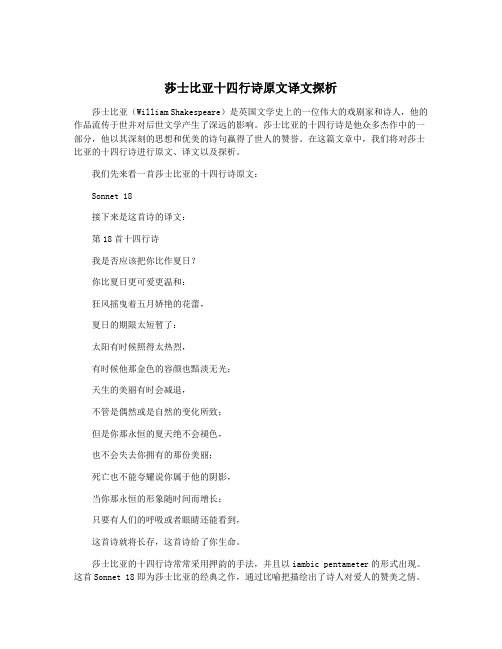
莎士比亚十四行诗原文译文探析莎士比亚(William Shakespeare)是英国文学史上的一位伟大的戏剧家和诗人,他的作品流传于世并对后世文学产生了深远的影响。
莎士比亚的十四行诗是他众多杰作中的一部分,他以其深刻的思想和优美的诗句赢得了世人的赞誉。
在这篇文章中,我们将对莎士比亚的十四行诗进行原文、译文以及探析。
我们先来看一首莎士比亚的十四行诗原文:Sonnet 18接下来是这首诗的译文:第18首十四行诗我是否应该把你比作夏日?你比夏日更可爱更温和:狂风摇曳着五月娇艳的花蕾,夏日的期限太短暂了:太阳有时候照得太热烈,有时候他那金色的容颜也黯淡无光;天生的美丽有时会减退,不管是偶然或是自然的变化所致;但是你那永恒的夏天绝不会褪色,也不会失去你拥有的那份美丽;死亡也不能夸耀说你属于他的阴影,当你那永恒的形象随时间而增长;只要有人们的呼吸或者眼睛还能看到,这首诗就将长存,这首诗给了你生命。
莎士比亚的十四行诗常常采用押韵的手法,并且以iambic pentameter的形式出现。
这首Sonnet 18即为莎士比亚的经典之作,通过比喻把描绘出了诗人对爱人的赞美之情。
诗的开篇即以修辞设问来呈现,作者在问自己是否应该将心上人比作夏日,然后通过下文的赞美,表达出对心上人更为深切的赞美之情。
他认为心上人的美丽胜过夏日,夏日虽然美丽,却不如心上人温和可爱。
由此,诗中呈现了作者对心上人的赞美之情。
在诗的后半部分,诗人使用了“永恒的夏天”来包含对心上人的赞美之语,不管是风吹雨打,都不会改变。
随后,诗人再以修辞手法呼唤死亡无法摧毁对心上人的赞美之情,并肯定了这份美丽将长存与时间,给了心上人永生。
通过以上对原文和译文的对比分析,我们不难发现莎士比亚的十四行诗所蕴含的深刻情感。
诗人通过对夏日和心上人的比较,抒发了对心上人深切的赞美之情,并以永恒的夏天来喻示继续深切的情感长存。
这首诗也正是莎士比亚情感抒发的一个缩影,其深情款款的语言和艺术手法让我们感受到了莎士比亚伟大的文学魅力。
十四行诗116-威廉·莎士比亚
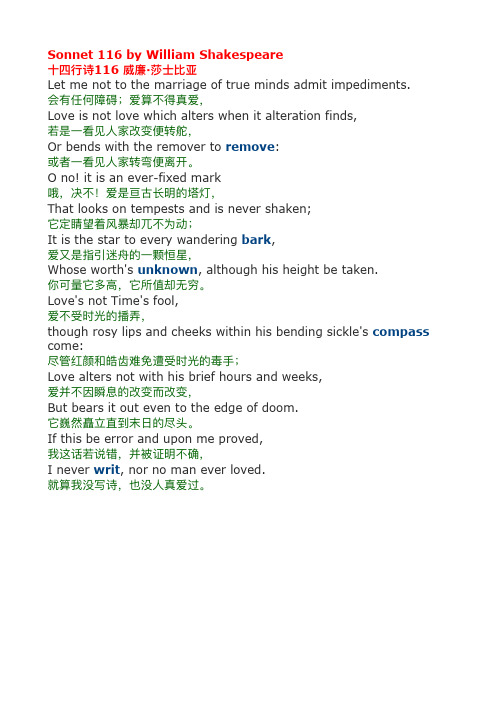
Sonnet 116 by William Shakespeare⼗十四⾏行行诗116 威廉·莎⼠士⽐比亚Let me not to the marriage of true minds admit impediments. 会有任何障碍;爱算不不得真爱,Love is not love which alters when it alteration finds,若是⼀一看⻅见⼈人家改变便便转舵,Or bends with the remover to remove:或者⼀一看⻅见⼈人家转弯便便离开。
O no! it is an ever-fixed mark哦,决不不!爱是亘古⻓长明的塔灯,That looks on tempests and is never shaken;它定睛望着⻛风暴暴却⺎兀兀不不为动;It is the star to every wandering bark,爱⼜又是指引迷⾈舟的⼀一颗恒星,Whose worth's unknown, although his height be taken.你可量量它多⾼高,它所值却⽆无穷。
Love's not Time's fool,爱不不受时光的播弄弄,though rosy lips and cheeks within his bending sickle's compass come:尽管红颜和皓⻮齿难免遭受时光的毒⼿手;Love alters not with his brief hours and weeks,爱并不不因瞬息的改变⽽而改变,But bears it out even to the edge of doom.它巍然矗⽴立直到末⽇日的尽头。
If this be error and upon me proved,我这话若说错,并被证明不不确,I never writ, nor no man ever loved.就算我没写诗,也没⼈人真爱过。
莎士比亚十四行诗赏析

我能否将你比作夏天?你比夏天更美丽温婉。
狂风将五月的蓓蕾凋残,夏日的勾留何其短暂。
休恋那丽日当空,转眼会云雾迷蒙。
休叹那百花飘零,催折于无常的天命。
唯有你永恒的夏日常新,你的美貌亦毫发无损。
死神也无缘将你幽禁,你在我永恒的诗中长存。
只要世间尚有人吟诵我的诗篇,这诗就将不朽,永葆你的芳颜。
Shakespeare - Sonnet 18 This sonnet is by far one of the most interesting poems in the book. Of Shakespeare's sonnets in the text, this is one of the most moving lyric poems that I have ever read. There is great use of imagery within the sonnet. This is not to say that the rest of the poems in the book were not good, but this to me was the best, most interesting, and most beautiful of them. It is mainly due to the simplicity and loveliness of the poem抯praise of the beloved woman that it has guaranteed its place in my mind, and heart.The speaker of the poem opens with a question that is addressed to the beloved, "Shall I compare thee to a summer's day?" This question is comparing her to the summer time of the year. It is during this time when the flowers are blooming, trees are full of leaves, the weather is warm, and it is generally thought of as an enjoyable time during the year. The following eleven lines in the poem are also dedicated to similar comparisons between the beloved and summer days. In lines 2 and 3, the speaker explains what mainly separates the young woman from the summer's day: she is "more lovely and more temperate." (Line 2) Summer's days tend toward extremes: they are sometimes shaken by "rough winds" (line3) which happens and is not always as welcoming as the woman. However in line 4, the speaker gives the feeling again that the summer months are often to short by saying, "And summer抯lease hath too short a date." In the summer days, the sun, "the eye of heaven" (line 5), often shines "too hot," or too dim, "his gold complexion dimmed" (line 6), that is there are many hot days during the summer but soon the sun begins to set earlier at night because autumn is approaching. Summer is moving along too quickly for the speaker, its time here needs to be longer, and it also means that the chilling of autumn is coming upon us because the flowers will soon be withering, as "every fair from fair sometime declines." (Line 7) The final portion of the sonnet tells how the beloved differs from the summer in various respects. Her beauty will be one that lasts forever, "Thy eternal summer shall not fade." (Line 9), and never end or die. In the couplet at the bottom, the speaker expla ins how that the beloved's beauty will accomplish this everlasting life unlike a summer. And it is because her beauty is kept alive in this poem, which will last forever. It will live "as long as men can breathe or eyes can see." (Line 13)On the surface, the poem is on the surface simply a statement of praise about the beauty of the beloved woman and perhaps summer to the speaker is sometimes too unpleasant with the extremes of windiness and heat that go along with it. However, the beloved in the poem is always mild and temperate by her nature and nothing at all like the summer. It is incidentally brought to life as being described as the "eye of heaven" with its "gold complexion". The imagery throughout the sonnet is simple and attainable to the reader, which is a key factor in understanding the poem. Then the speaker begins to describe the summer again with the "darling buds of May" giving way to the " summer抯lease", springtime moving into the warmth of the summer. The speaker then starts to promise to talk about this beloved, that is so great and awing that she is to live forever in this sonnet. The beloved is so great that the speaker will even go as far as to say that, "So long as men breathe, or eyes can see," the woman will live. The language is almost too simple when comparing it to the rest of Shakespeare抯sonnets; it is not heavy with alliteration or verse, and nearly every line is its own self-contained clause, almost every line ends with some punctuation that effects a pause. But it is this that makes Sonnet18 stand out for the rest in the book. It is much more attainable to understand and it allows for the reader to fully understand how great this beloved truly is because she may live forever in it. An impor tant theme of the sonnet, as it is an important theme throughout much of the poetry in general, is the power of the speaker's poem to defy time and last forever. And so by doing this it is then carrying the beauty of the beloved down to future generations and eventually for al of eternity. The beloved's "eternal summer" shall not fade precisely because it is embodied in the sonnet: "Solong as men can breathe or eyes can see," (line 13) the speaker writes in the couplet, "So long lives this, and this gives life to thee."(Line 14) With this the speaker is able to accomplish what many have done in poetry and that is to give the gift of an eternal life to someone that they believe is special and outshines everyone else around them. Perhaps it is because of a physical beauty that the speaker see, but I believe that it is more because of the internal beauty as seen in line 2, "Thou art more lovely and more temperate", that the beloved is deserving to live on forever.1.Critical CommentariesSonnet 18One of the best known of Shakespeare’s sonnets, Sonnet 18 is memorable for the skillful and varied presentat ion of subject matter, in which the poet’s feelings reach a level of rapture unseen in the previous sonnets. The poet here abandons his quest for the y outh to h ave a child, and instead glories in the youth’s beauty.Initially, the poet poses a question—”Shall I compare thee to a summer’s day?”—and then reflects on it, remarking that the youth’s be auty far surpasses summer’s delights. The imagery is the very essence of simplicity: “wind” and “buds.” In the fourth line, l egal termi nology—”summer’s lease”—is introduced in contrast to the commonplace images in the first three lines. Note also the poet’s use of ex tremes in the phrases “more lovely,” “all too short,” and “too hot”; these phrases emp hasize the young man’s beauty.Although lines 9 through 12 are marked by a more expansive tone and deeper feeling, the poet returns to the simplicity of the openin g images. As one expects in Shakespeare’s sonnets, the proposition that the poet sets up in the first eight lines—that all nature is subj ect to imperfection—is now contrasted in these next four lines beginning with “But.” Although beauty naturally declines at some point —”And every fair from fair sometime declines”—the youth’s beauty will not; his unchanging appearance is atypical of nature’s steady progression. Even death is impotent against the youth’s beauty. Note the ambiguity in the phrase “eternal lines”: Are these “lines” the poet’s verses or the youth’s hoped-for children? Or are they simply wrinkles meant to represent the process of aging? Whatever the an swer, the poet is jubilant in this sonnet because nothing threatens the you ng man’s beautiful appearance.Then follows the concluding couplet: “So long as men can breathe, or eyes can see, / So long lives this, and this gives life to thee.” The poet is describing not what the youth is but what he will be ages hence, as captured in the poet’s eternal verse—or again, in a h oped-for child. Whatever one may feel about the sentiment expressed in the sonnet and especially in these last two lines, one cannot h e lp but notice an abrupt change in the poet’s own estimate of his poetic writing. Following the poet’s disparaging reference t o his “pu pil pen” and “barren rhyme” in Sonnet 16, it comes as a surprise in Sonnet 18 to find him boasting that his poetry will be eternal.__________________________________________________________________2.Sonnet 18SummaryThe speaker opens the poem with a question addressed to the beloved: "Shall I compare thee to a summer's day?" The next eleven lin es are devoted to such a comparison. In line 2, the speaker stipulates what mainly differentiates the young man from the summer's day: he is "more lovely and more temperate." Summer's days tend toward extremes: they are shaken by "rough winds"; in them, the sun ("the eye of heaven") often shines "too hot," or too dim. And summer is fleeting: its date is too short, and it leads to the withering o f autumn, as "every fair from fair sometime declines." The final quatrain of the sonnet tells how the beloved differs from the summer in that respect: his beauty will last forever ("Thy eternal summer shall not fade...") and never die. In the couplet, the speaker explains how the beloved's beauty will accomplish this feat, and not perish because it is preserved in the poem, which will last forever; it wil l live "as long as men can breathe or eyes can see."CommentaryThis sonnet is certainly the most famous in the sequence of Shakespeare's sonnets; it may be the most famous lyric poem in En glish. Among Shakespeare's works, only lines such as "To be or not to be" and "Romeo, Romeo, wherefore art thou Romeo?" are better-kno wn. This is not to say that it is at all the best or most interesting or most beautiful of the sonnets; but the simplicity an d loveliness o f its praise of the beloved has guaranteed its place.On the surface, the poem is simply a statement of praise about the beauty of the beloved; summer tends to unpleasant extremes of wi ndiness and heat, but the beloved is always mild and temperate. Summer is incidentally personified as the "eye of heaven" with its "g old complexion"; the imagery throughout is simple and unaffected, with the "darling buds of May" giving way to the "eternal s ummer", which the speaker promises the beloved. The language, too, is comparatively unadorned for the sonnets; it is not heavy with alliteratio n or assonance, and nearly every line is its own self-contained clause--almost every line ends with some punctuation, which effects a p ause.Sonnet 18 is the first poem in the sonnets not to explicitly encourage the young man to have children. The "procreation" sequence ofthe first 17 sonnets ended with the speaker's realization that the young man might not need children to preserve his beauty; he could a lso live, the speaker writes at the end of Sonnet 17, "in my rhyme." Sonnet 18, then, is the first "rhyme"--the speaker's first attempt t o preserve the young man's beauty for all time. An important theme of the sonnet (as it is an important theme throughout much of th e sequence) is the power of the speaker's poem to defy time and last forever, carrying the beauty of the beloved down to future gener ations. The beloved's "eternal summer" shall not fade precisely because it is embodied in the sonnet: "So long as men can breathe or eyes can see," the speaker writes in the couplet, "So long lives this, and this gives life to thee."IntroductionSonnet 18 deserves its fame because it is one of the most beautifully written verses in the English language. T he sonnet’s endurance comes from Shakespeare’s ability to capture the essence of love so cleanly and succinctly.After much debate amongst scholars, it is now generally accepted that the subject of the poem is male. In 1640, a publisher called John Benson released a highly inaccurate edition of S hakespeare’s sonnets in which he edited out the young man, replacing “he” with “she”.Benson’s revision was considered to be the standard text until 1780 when Edmond Malone returned to the 1690 quarto and re-edited the poems. Scholars soon realized that the first 126 sonnets were originally addressed to a young man sparking debates about Shakespeare’s sexuality. T he nature of the relationship between the two men is highly ambiguous and it is often impossible to tell if S hakespeare is describing platonic love or erotic love.CommentaryT he opening line poses a simple question which the rest of the sonnet answers. T he poet compares his loved one to a summer’s day and finds him to be “more lovely and more temperate.”T he poet discovers that love and the man’s beauty are more permanent than a summer’s day because summer is tainted by occasional winds and the eventual change of season. While summer must always come to an end, the speaker’s love for the man is eternal.For the speaker, love transcends nature in two ways:1.T he speaker begins by comparing the man’s beauty to summer, but soon the man becomes a force of nature himself.In the line, “thy eternal summer shall not fade,” the man suddenly embodies summer. As a perfect being, he becomes more powerful than the summer’s day to which he was being compared.2.T he poet’s love is so powerful that even death is unable to curtail it. T he speaker’s love lives on for futuregenerations to admire through the power of the written word – through the sonnet itself. T he final couplet explains that the beloved’s “eternal summer” will continue as long as there are people alive to read this sonnet:So long as men can breathe or eyes can see,So long lives this, and this gives life to thee.T he young man to whom the poem is addressed i s the muse for Shakespeare’s first 126 sonnets. Although there is some debate about the correct ordering of the texts, the first 126 sonnets are thematically interlinked and demonstrate a progressive narrative. T hey tell of a romantic affair that becomes more passionate and intense with each sonnet.In previous sonnets, the poet has been trying to convince the young man to settle down and have children, but in Sonnet 18 the speaker abandons this domesticity for the first time and accepts love’s all-consuming passion – a theme that is set to continue in the sonnets that follow.。
莎士比亚十四行诗原文译文探析
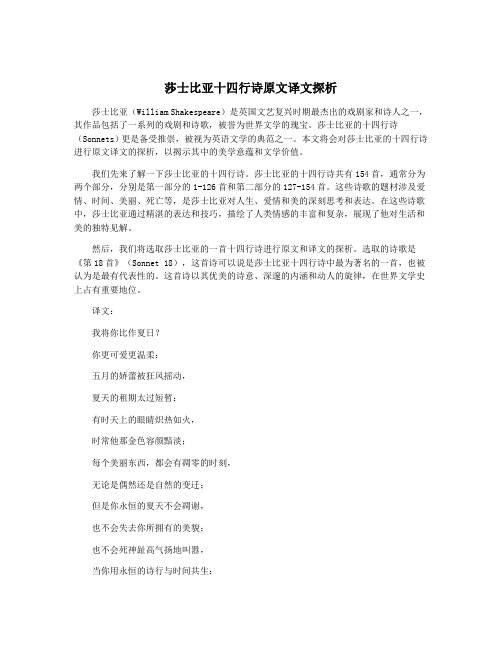
莎士比亚十四行诗原文译文探析莎士比亚(William Shakespeare)是英国文艺复兴时期最杰出的戏剧家和诗人之一,其作品包括了一系列的戏剧和诗歌,被誉为世界文学的瑰宝。
莎士比亚的十四行诗(Sonnets)更是备受推崇,被视为英语文学的典范之一。
本文将会对莎士比亚的十四行诗进行原文译文的探析,以揭示其中的美学意蕴和文学价值。
我们先来了解一下莎士比亚的十四行诗。
莎士比亚的十四行诗共有154首,通常分为两个部分,分别是第一部分的1-126首和第二部分的127-154首。
这些诗歌的题材涉及爱情、时间、美丽、死亡等,是莎士比亚对人生、爱情和美的深刻思考和表达。
在这些诗歌中,莎士比亚通过精湛的表达和技巧,描绘了人类情感的丰富和复杂,展现了他对生活和美的独特见解。
然后,我们将选取莎士比亚的一首十四行诗进行原文和译文的探析。
选取的诗歌是《第18首》(Sonnet 18),这首诗可以说是莎士比亚十四行诗中最为著名的一首,也被认为是最有代表性的。
这首诗以其优美的诗意、深邃的内涵和动人的旋律,在世界文学史上占有重要地位。
译文:我将你比作夏日?你更可爱更温柔:五月的娇蕾被狂风摇动,夏天的租期太过短暂:有时天上的眼睛炽热如火,时常他那金色容颜黯淡;每个美丽东西,都会有凋零的时刻,无论是偶然还是自然的变迁;但是你永恒的夏天不会凋谢,也不会失去你所拥有的美貌;也不会死神趾高气扬地叫嚣,当你用永恒的诗行与时间共生:只要人们能呼吸只要人们能看见,这诗行一直存在,它赋予你生命。
在这首诗中,莎士比亚通过比喻的手法,将所爱之人比作夏日的美丽。
一开始,他询问自己是否应该将所爱之人比作夏日,然后通过对夏日的描述,展现出所爱之人更胜一筹。
在这首诗中,莎士比亚通过对夏日的描绘,表达了对时间的流逝和美的凋零的深刻思考,同时也展现了对所爱之人的赞美和珍视之情。
在译文中,译者通过对原文的理解和感悟,将莎士比亚的意境和情感进行了精准的表达,使得译文既忠于原文的意义和语境,又能够翻译出诗歌的韵律和情感。
莎士比亚十四行诗原文译文探析
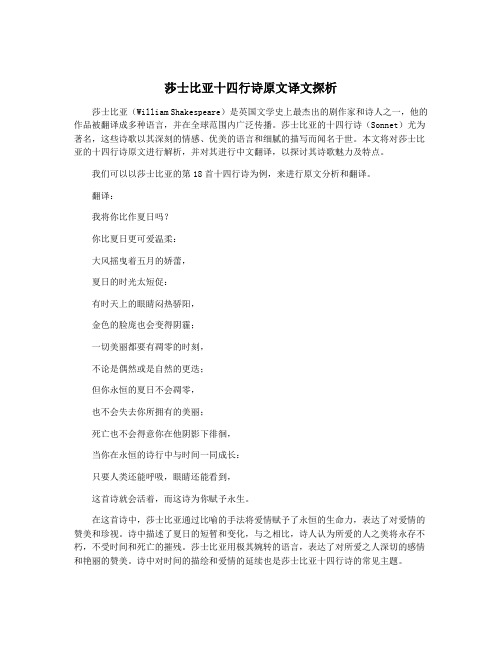
莎士比亚十四行诗原文译文探析莎士比亚(William Shakespeare)是英国文学史上最杰出的剧作家和诗人之一,他的作品被翻译成多种语言,并在全球范围内广泛传播。
莎士比亚的十四行诗(Sonnet)尤为著名,这些诗歌以其深刻的情感、优美的语言和细腻的描写而闻名于世。
本文将对莎士比亚的十四行诗原文进行解析,并对其进行中文翻译,以探讨其诗歌魅力及特点。
我们可以以莎士比亚的第18首十四行诗为例,来进行原文分析和翻译。
翻译:我将你比作夏日吗?你比夏日更可爱温柔:大风摇曳着五月的娇蕾,夏日的时光太短促:有时天上的眼睛闷热骄阳,金色的脸庞也会变得阴霾;一切美丽都要有凋零的时刻,不论是偶然或是自然的更迭;但你永恒的夏日不会凋零,也不会失去你所拥有的美丽;死亡也不会得意你在他阴影下徘徊,当你在永恒的诗行中与时间一同成长:只要人类还能呼吸,眼睛还能看到,这首诗就会活着,而这诗为你赋予永生。
在这首诗中,莎士比亚通过比喻的手法将爱情赋予了永恒的生命力,表达了对爱情的赞美和珍视。
诗中描述了夏日的短暂和变化,与之相比,诗人认为所爱的人之美将永存不朽,不受时间和死亡的摧残。
莎士比亚用极其婉转的语言,表达了对所爱之人深切的感情和艳丽的赞美。
诗中对时间的描绘和爱情的延续也是莎士比亚十四行诗的常见主题。
莎士比亚的十四行诗在原文中运用了丰富的修辞手法,包括比喻、排比、转折等,使诗歌语言优美、精练,并能够深刻表达其情感。
莎士比亚对押韵和韵脚的运用也非常出色,使得诗歌在朗诵时具有优美的韵律感,增强了诗歌的感染力和表现力。
对于翻译而言,莎士比亚的十四行诗的翻译可以说是一项极具挑战性的任务。
翻译者需要理解莎士比亚的原文意境和表达方式,将其准确地传达到目标语言中去。
在保持原文风格和韵律的基础上,翻译者还需尽量使译文通顺、自然,表达出原文的情感和内涵。
莎士比亚的十四行诗翻译对于翻译者的语言功底和文学素养都有较高的要求。
莎士比亚的十四行诗中常常运用反讽、夸张等修辞手法,这些手法使诗歌在表达情感时更显得生动、深刻。
SONNET莎士比亚十四行诗全文
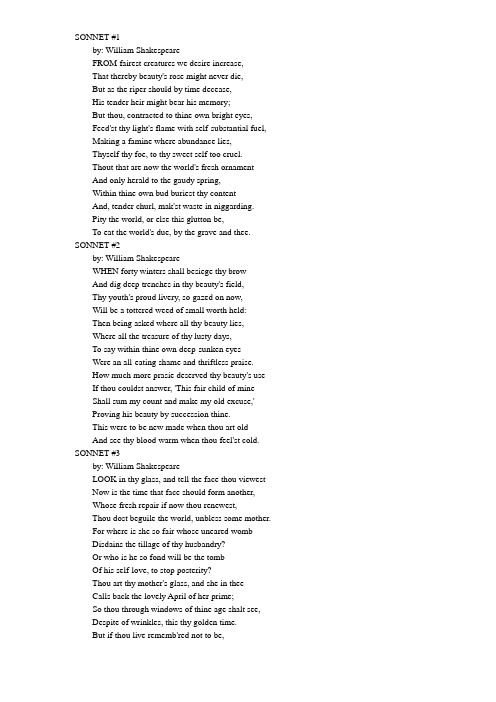
SONNET #1by: William ShakespeareFROM fairest creatures we desire increase,That thereby beauty's rose might never die,But as the riper should by time decease,His tender heir might bear his memory;But thou, contracted to thine own bright eyes,Feed'st thy light's flame with self-substantial fuel,Making a famine where abundance lies,Thyself thy foe, to thy sweet self too cruel.Thout that are now the world's fresh ornamentAnd only herald to the gaudy spring,Within thine own bud buriest thy contentAnd, tender churl, mak'st waste in niggarding.Pity the world, or else this glutton be,To eat the world's due, by the grave and thee. SONNET #2by: William ShakespeareWHEN forty winters shall besiege thy browAnd dig deep trenches in thy beauty's field,Thy youth's proud livery, so gazed on now,Will be a tottered weed of small worth held:Then being asked where all thy beauty lies,Where all the treasure of thy lusty days,To say within thine own deep-sunken eyesWere an all-eating shame and thriftless praise.How much more prasie deserved thy beauty's useIf thou couldst answer, 'This fair child of mineShall sum my count and make my old excuse,'Proving his beauty by succession thine.This were to be new made when thou art oldAnd see thy blood warm when thou feel'st cold. SONNET #3by: William ShakespeareLOOK in thy glass, and tell the face thou viewestNow is the time that face should form another,Whose fresh repair if now thou renewest,Thou dost beguile the world, unbless some mother.For where is she so fair whose uneared wombDisdains the tillage of thy husbandry?Or who is he so fond will be the tombOf his self-love, to stop posterity?Thou art thy mother's glass, and she in theeCalls back the lovely April of her prime;So thou through windows of thine age shalt see,Despite of wrinkles, this thy golden time.But if thou live rememb'red not to be,Die single, and thine image dies with thee. SONNET #4by: William ShakespeareUNTHRIFTY loveliness, why dost thou spendUpon thyself they beauty's legacy?Nature's bequest gives nothing but doth lend,And, being frank, she lends to those are free.Then, beateous niggard, why dost thou abuseThe bounteous largess given thee to give?Profitless userer, why dost thou useSo great a sum of sums, yet canst not live?For, having traffic with thyself alone,Thou of thyself thy sweet self dost deceive:Then how, when Nature calls thee to be gone,What acceptable audit canst thou leave?Thy unused beauty must be tombed with thee,Which, usèd, lives th' executor to be.SONNET #5by: William ShakespeareTHOSE hours that with gentle work did frameThe lovely gaze where every eye doth dwellWill play the tyrants to the very sameAnd that unfair which fairly doth excel;For never-resting time leads summer onTo hideous winter and confounds him there,Sap checked with frost and lusty leaves quite gone,Beauty o'ersnowed and bareness everywhere.Then, were not summer's distillation leftA liquid prisoner pent in walls of glass,Beauty's effect with beauty were bereft,Nor it nor no remembrance what it was:But flowers distilled, though they with winter meet,Leese but there snow; their substance still lives sweet. SONNET #6by: William ShakespeareTHEN let not winter's ragged hand defaceIn thee thy summer ere thou be distilled:Make sweet some vial; treasure thou some placeWith beauty's treasure ere it be self-killed.That use is not forbidden usuryWhich happies those that pay the willing loan;That's for thyself to breed another thee,Or ten times happier be it ten for one.Ten times thyself were happier than thou art,If ten of thine ten times refigured thee:Then what could death do if thou shouldst depart,Leaving thee living in posterity?Be not self-willed, for thou art much too fairTo be death's conquest and make worms thine heir. SONNET #7by: William ShakespeareLO, in the orient when the gracious lightLifts up his burning head, each under eyeDoth homage to his new-appearing sight,Serving with looks his sacred majesty;And having climbed the steep-up heavenly hill,Resembling strong yough in his middle age,Yet mortal looks adore his beauty still,Attending on his golden pilgrimage;But when from highmost pitch, with weary car,Like feeble age he reeleth from the day,The eyes, fore duteous, now converted areFrom his low tract and look another way:So thou, thyself outgoing in thy noon,Unlooked on diest unless thou get a son. SONNET #8by: William ShakespeareMUSIC to hear, why hear'st thou music sadly?Sweets with sweets war not, joy delights in joy:Why lov'st thou that which thou receiv'st not gladly, Or else receiv'st with pleasure thine annoy?If the true concord of well-tunèd sounds,By unions married, do offend thine ear,They do but sweetly chide thee, who confoundsIn singleness the parts that thou shouldst bear.Mark how one string, sweet husband to another,Strikes each in each by mutual ordering;Resembling sire and child and happy mother,Who, all in one, one pleasing note do sing;Whose speechless song, being many, seeming one,Sings this to thee, 'Thou single wilt prove none.' SONNET #9by: William ShakespeareIS it for fear to wet a widow's eyeThat thou consum'st thyself in single life?Ah, if thou issueless shalt hap to die,The world will wail thee like a makeless wife;The world will be thy widow, and still weepThat thou no form of thee hast left behind,When every private widow well may keep,By children's eyes, her husband's shape in mind.Look what an unthrift in the world doth spendShifts but his place, for still the world enjoys it;But beauty's waste hath in the world an end,And, kept unused, the user so destroys it:No love toward others in that bosom sitsThan on himself such murd'rous shame commits SONNET #10by: William ShakespeareFOR shame, deny that thou bear'st love to anyWho for thyself art so unprovident:Grant, if thou wilt, thou art beloved of many,But that thou none lov'st is most evident;For thou art so possessed with murd'rous hateThat 'gainst thyself thou stick'st not to conspire,Seeking that beauteous roof to ruinateWhich to repair should be thy chief desire.O, change thy thought, that I may change my mind;Shall hate be fairer lodged than gentle love?Be as thy presence is, gracious and kind,Or to thyself at least kind-hearted prove:Make thee another self for love of me,That beauty still may live in thine or thee.SONNET #11by: William ShakespeareAS fast as thou shalt wane, so fast thou grow'stIn one of thine, from that which thou departest;And that fresh blood which youngly thou bestow'stThou mayst call thine when thou from youth convertest.Herein lives wisdom, beauty, and increase;Without this, folly, age, and cold decay.If all were minded so, the times should cease,And threescore year would make the world away.Let those whom Nature hath not made for store,Harsh, featureless, and rude, barrenly perish:Look whom she best endowed she gave the more,Which bounteous gift thou shouldst in bounty cherish.She carved thee for her seal, and meant therebyThou shouldst print more, not let that copy die. SONNET #12by: William ShakespeareWHEN I do count the clock that tells the timeAnd see the brave day sunk in hideous night,When I behold the violet past primeAnd sable curls all silvered o'er with white,When lofty trees I see barren of leaves,Which erst from heat did canopy the herd,And summer's green all girded up in sheavesBorne on the bier with white and bristly beard;Then of thy beauty do I question makeThat thou among the wastes of time must go,Since sweets and beauties do themselves forsakeAnd die as fast as they see others grow;And nothing 'gainst Time's scythe can make defense Save breed, to brave him when he takes thee hence. SONNET #13by: William ShakespeareO , THAT you were yourself, but, love, you areNo longer yours than you yourself here live:Against this coming end you should prepare,And your sweet semblance to some other give.So should that beauty which you hold in leaseFind no determination; then you wereYourself again after yourself's deceaseWhen your sweet issue your sweet form should bear.Who lets so fair a house fall to decay,Which husbandry in honor might upholdAgainst the stormy gusts of winter's dayAnd barren rage of death's eternal cold?O, none but unthrifts! Dear my love, you knowYou had a father -- let your son say so.SONNET #14by: William ShakespeareNOT from the stars do I my judgment pluck,And yet methinks I have astronomy;But not to tell of good or evil luck,Of plagues, of dearths, or season's quality;Nor can I fortune to brief minutes tell,Pointing to each his thunder, rain, and wind,Or say with princes if it shall go wellBy oft predict that I in heaven find;But from thine eyes my knowledge I derive,And, constant stars, in them I read such artAs truth and beauty shall together thriveIf from thyself to store thou wouldst convert:Or else of thee this I prognosticate,Thy end is truth's and beauty's doom and date. SONNET #15by: William ShakespeareWHEN I consider everything that growsHolds in perfection but a little moment,That this huge stage presenteth nought but showsWhereon the stars in secret influence comment;When I perceive that men as plants increase,Cheerèd and checked even by the selfsame sky,V aunt in their youthful sap, at height decrease,And wear their brave state out of memory:Then the conceit of this inconstant staySets you most rich in youth before my sight,Where wasteful Time debateth with DecayTo change your day of youth to sullied night;And, all in war with Time for love of you,As he takes from you, I ingraft you new.SONNET #16by: William ShakespeareBUT wherefore do not you a mightier wayMake war upon this bloody tyrant, Time?And fortify yourself in your decayWith means more blessèd than my barren rime?Now stand you on the top of happy hours,And many maiden gardens, yet unset,With virtuous wish would bear your living flowers,Much liker than your painted counterfeit:So should the lines of life that life repairWhich this time's pencil or my pupil pen,Neither in inward worth nor outward fairCan make you live yourself in eyes of men.To give away yourself keeps yourself still,And you must live, drawn by your own sweet skill."Sonnet #16" was originally published in Shake-speares Sonnets: Never before Imprinted (1609).SONNET #17by: William ShakespeareHO will believe my verse in time to comeIf it were filled with your most high deserts?Though yet, heaven knows, it is but as a tombWhich hides your life and shows not half your parts.If I could write the beauty of your eyesAnd in fresh numbers number all your graces,The age to come would say, 'This poet lies--Such heavenly touches ne'er touched earthly faces.'So should my papers, yellowed with their age,Be scorned, like old men of less truth than tongue,And your true rights be termed a poet's rageAnd stretchèd metre of an antique song.But were some child of yours alive that time,You should live twice--in it and in my rime."Sonnet #17" was originally published in Shake-speares Sonnets: Never before Imprinted (1609).SONNET #18by: William ShakespeareShall I compare thee to a summer's day?Thou art more lovely and more temperate.Rough winds do shake the darling buds of May,And summer's lease hath all too short a date.Sometime too hot the eye of heaven shines,And often is his gold complexion dimmed;And every fair from fair sometime declines,By chance, or nature's changing course, untrimmed:But thy eternal summer shall not fadeNor lose possession of that fair thou ow'st,Nor shall Death brag thou wand'rest in his shadeWhen in eternal lines to time thou grow'st.So long as men can breathe or eyes can see,So long lives this, and this gives life to thee."Sonnet #18" was originally published in Shake-speares Sonnets: Never before Imprinted (1609).SONNET #19by: William ShakespeareDevouring time, blunt thou the lion's paws,And make the earth devour her own sweet brood;Pluck the keen teeth from the fierce tiger's jaws,And burn the long-lived phoenix in her blood;Make glad and sorry seasons as they fleet'st,And do whate'er thou wilt, swift-footed Time,To the wide world and all her fading sweets,But I forbid thee one most heinous crime:O, carve not with thy hours my love's fair brow,Nor draw no lines there with thine antique pen;Him in thy course untainted do allowFor beauty's pattern to succeeding men.Yet do thy worst, old Time: despite thy wrong,My love shall in my verse ever live young."Sonnet #19" was originally published in Shake-speares Sonnets: Never before Imprinted (1609).SONNET #20by: William Shakespeare (1564-1616)WOMAN'S face, with Nature's own hand painted,Hast thou, the master-mistress of my passion;A woman's gentle heart, but not acquaintedWith shifting change, as is false women's fashion;An eye more bright than theirs, less false in rolling,Gilding the object whereupon it gazeth;A man in hue all hues in his controlling,Which steals men's eyes and women's souls amazeth.And for a woman wert thou first created,Till Nature as she wrought thee fell a-doting,And by addition me of thee defeatedBy adding one thing to my purpose nothing.But since she pricked thee out for women's pleasure,Mine be thy love, and thy love's use their treasure."Sonnet #20" was originally published in Shake-speares Sonnets: Never before Imprinted(1609).SONNET #21by: William Shakespeare (1564-1616)O is it not with me as with that MuseStirred by a painted beauty to his verse,Who heaven itself for ornament doth useAnd every fair with his fair doth rehearse;Making a couplement of proud compareWith sun and moon, with earth and sea's rich gems,With April's first-born flowers, and all things rareThat heaven's airs in this huge rondure hems.O let me, true in love, but truly write,And then believe me, my love is as fairAs any mother's child, though not so brightAs those gold candles fixed in heaven's air:Let them say more that like of hearsay well;I will not praise that purpose not to sell."Sonnet #21" was originally published in Shake-speares Sonnets: Never before Imprinted (1609).SONNET #22by: William Shakespeare (1564-1616)MY glass shall not persuade me I am oldSo long as youth and thou are of one date;But when in thee time's furrows I behold,Then look I death my days should expiate.For all that beauty that doth cover theeIs but the seemly raiment of my heart,Which in they breast doth live, as thine in me:How can I then be elder than thou art?O therefore, love, be of thyself so waryAs I, not for myself, but for thee will,Bearing thy heart, which I will keep so charyAs tender nurse her babe from faring ill.Presume not on thy heart when mine is slain;Thou gav'st me thine not to give back again."Sonnet #22" was originally published in Shake-speares Sonnets: Never before Imprinted (1609).SONNET #23by: William Shakespeare (1564-1616)AS an unperfect actor on the stage,Who with his fear is put besides his part,Or some fierce thing replete with too much rage,Whose strength's abundance weakens his own heart;So I, for fear of trust, forget to sayThe perfect ceremony of love's rite,And in mine own love's strength seem to decay,O'ercharged with burden of mine own love's might.O, let my books be then the eloquenceAnd dump presagers of my speaking breast,Who plead for love, and look for recompense,More than that tongue that more hath more expressed.O, learn to read what silent love hath writ:To hear with eyes belongs to love's fine wit."Sonnet #23" was originally published in Shake-speares Sonnets: Never before Imprinted (1609).SONNET #24by: William Shakespeare (1564-1616)MINE eye hath played the painter and hath stelledThy beauty's form in table of my heart;My body is the frame wherein 'tis held,And perspective it is best painter's art.For through the painter must you see his skillTo fine where your true image pictured lies,Which in my bosom's shop is hanging still,That hath his windows glazèd with thine eyes.Now see what good turns eyes for eyes have done:Mine eyes have drawn thy shape, and thine for meAre windows to my breast, wherethrough the sunDelights to peep, to gaze therein on thee.Yet eyes this cunning want to grace their art;They draw but what they see, know not the heart."Sonnet #24" was originally published in Shake-speares Sonnets: Never before Imprinted (1609).SONNET #25by: William Shakespeare (1564-1616)LET those who are in favor with their starsOf public honor and proud titles boast,Whilst I, whom fortune of such triumph bars,Unlooked for joy in that I honor most.Great princes' favorites their fair leaves spreadBut as the marigold at the sun's eye;And in themselves their pride lies burièd,For at a frown they in their glory die.The painful warrior famousèd for fight,After a thousand victories once foiled,Is from the book of honor rasèd quite,And all the rest forgot for which he toiled.Then happy I, that love and am belovedWhere I may not remove nor be removed."Sonnet #25" was originally published in Shake-speares Sonnets: Never before Imprinted (1609).SONNET #26by: William Shakespeare (1564-1616)LORD of my love, to whom in vassalageThy merit hath my duty strongly knit,To thee I send this written ambassageTo witness duty, not to show my wit;Duty so great, which wit so poor as mineMay make seem bare, in wanting words to show it,But that I hope some good coneit of thineIn thy soul's thought, all naked, will bestow it;Till whatsoever star that guides my movingPoints on me graciously with fair aspect,And puts apparel on my tottered lovingTo show me worthy of thy sweet respect:Then may I dare to boast how I do love thee;Till then not show my head where thou mayest prove me."Sonnet #26" was originally published in Shake-speares Sonnets: Never before Imprinted (1609).SONNET #27by: William Shakespeare (1564-1616)WEARY with toil, I haste to my bed,The dear repose for limbs with travel tired,But then begins a journey in my headTo work my mind when body's work's expired;For then my thoughts, from far where I abide,Intend a zealous pilgrimage to thee,And keep my drooping eyelids open wide,Looking on darkness which the blind do see;Save that my soul's imaginary sightPresents thy shadow to my sightless view,Which, like a jewel hung in ghastly night,Makes black night beauteous and her old face new.Lo, thus, by day my limbs, by night my mind,For thee and for myself no quiet find."Sonnet #27" was originally published in Shake-speares Sonnets: Never before Imprinted (1609).SONNET #28by: William Shakespeare (1564-1616)HOW can I then return in happy plightThat am debarred the benefit of rest,When day's oppression is not eased by night,And each, though enemies to either's reign,Do in consent shake hands to torture me,The one by toil, the other to complainHow far I toil, still farther off from thee?I tell the day, to please him, thou art brightAnd dost him grace when clouds do blot the heaven;So flatter I the swart-complexioned night,When sparkling stars twire not, thou gild'st the even.But day doth daily draw my sorrows longer,And night doth nightly make grief's strength seem stronger."Sonnet #28" was originally published in Shake-speares Sonnets: Never before Imprinted (1609).SONNET #29by: William Shakespeare (1564-1616)WHEN, in disgrace with Fortune and men's eyes,I all alone beweep my outcast state,And trouble deaf heaven with my bootless cries,And look upon myself and curse my fate,Wishing me like to one more rich in hope,Featured like him, like him with friend's possessed,Desiring this man's art, and that man's scope,With what I most enjoy contented least;Yet in these thoughts myself almost despising,Haply I think on thee, and then my state,Like to the lark at break of day arisingFrom sullen earth, sings hymns at heaven's gate;For thy sweet love rememb'red such wealth bringsThat then I scorn to change my state with kings."Sonnet #29" was originally published in Shake-speares Sonnets: Never before Imprinted (1609).SONNET #30by: William Shakespeare (1564-1616)WHEN to the sessions of sweet silent thoughtI summon up remembrance of things past,I sigh the lack of many a thought I sought,And with old woes new wail my dear time's waste:Then can I drown an eye, unused to flow,For precious friends hid in death's dateless night,And weep afresh love's long since cancelled woe,And moan th' expense of many a vanished sight.Then can I grieve at grievances foregone,And heavily from woe to woe tell o'erThe sad account of fore-bemoanèd moan,Which I new pay as if not paid before.But if the while I think on thee, dear friend,All losses are restored and sorrows end."Sonnet #30" was originally published in Shake-speares Sonnets: Never before Imprinted (1609).SONNET #31by: William Shakespeare (1564-1616)THY bosom is endearèd with all heartsWhich I by lacking have supposèd dead;And their reigns love, and all love's loving parts,And all those friends which I thought burièd.How many a holy and obsequious tearHath dear religious love stol'n from mine eye,As interest of the dead, which now appearBut things removed that hidden in thee lie!Thou art the grave where buried love doth live,Hung with the trophies of my lovers gone,Who all their parts of me to thee did give;That due of many now is thine alone.Their images I loved I vew in thee,And thou, all they, hast all the all of me."Sonnet #31" was originally published in Shake-speares Sonnets: Never before Imprinted (1609).SONNET #32by: William Shakespeare (1564-1616)IF thou survive my well-contented dayWhen that churl Death my bones with dust shall cover,And shalt by fortune once more resurveyThese poor rude lines of thy deceasèd lover,Compare them with the bett-ring of the time,And though they be outstripped by every pen,Reserve them for my love, not for their rime,Exceeded by the height of happier men.O, then vouchsafe me but this loving thought:'Had my friend's Muse grown with this growing age,A dearer birth than this his love had broughtTo march in ranks of better equipage;But since he died, and poets better prove,Theirs for their style I'll read, his for his love.'。
shakespeare(sonnet) 英国文学 十四行诗
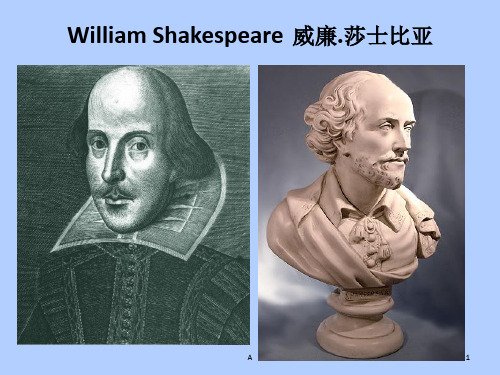
A
1
Who is Shakespeare?
A
2
艾汶河上斯特拉斯福:莎翁故居及塑像
A
3
莎翁部分作品:Some Works
A
4
Poems
• Poems: • I narrative: ballad, epic • II dramatic: dramatic monologue • III lyric (dealing with emotions, feelings): sonnet, ode,
happiness eyes
thine
yours the possessive pronoun
Verbs after second person subject should end with (e)st thou would(e)st thou hast thou wast thou didst thou singest thou growest
• The rhyme scheme is as follows: First stanza (quatrain): ABAB; Second stanza (quatrain): CDCD; Third stanza (quatrain): EFEF; Couplet: GG.
A
12
Early Modern English Grammar
A
11
Rime scheme
• Petrarchan (Italian) rime scheme: abba, abba, cd, cd, cd abba, abba, cde, cde
• The Shakespearean (English, or Elizabethan) sonnet is also called the English sonnet, with three four-line stanzas (quatrains) and a two-line unit called a couplet (对子).
莎士比亚十四行诗116赏析
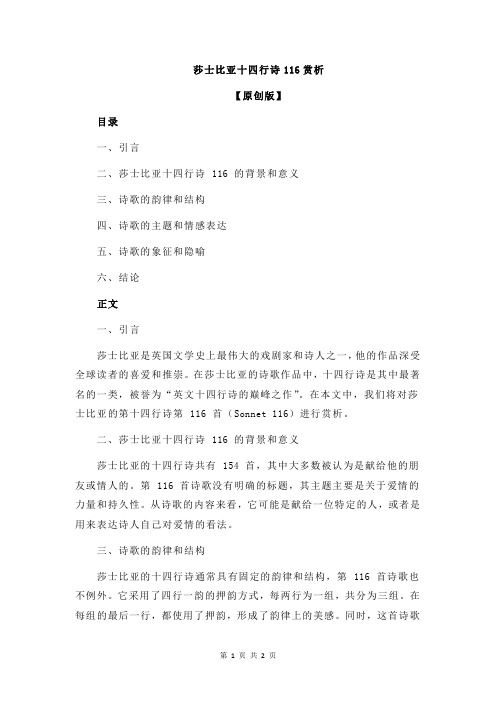
莎士比亚十四行诗116赏析【原创版】目录一、引言二、莎士比亚十四行诗 116 的背景和意义三、诗歌的韵律和结构四、诗歌的主题和情感表达五、诗歌的象征和隐喻六、结论正文一、引言莎士比亚是英国文学史上最伟大的戏剧家和诗人之一,他的作品深受全球读者的喜爱和推崇。
在莎士比亚的诗歌作品中,十四行诗是其中最著名的一类,被誉为“英文十四行诗的巅峰之作”。
在本文中,我们将对莎士比亚的第十四行诗第 116 首(Sonnet 116)进行赏析。
二、莎士比亚十四行诗 116 的背景和意义莎士比亚的十四行诗共有 154 首,其中大多数被认为是献给他的朋友或情人的。
第 116 首诗歌没有明确的标题,其主题主要是关于爱情的力量和持久性。
从诗歌的内容来看,它可能是献给一位特定的人,或者是用来表达诗人自己对爱情的看法。
三、诗歌的韵律和结构莎士比亚的十四行诗通常具有固定的韵律和结构,第 116 首诗歌也不例外。
它采用了四行一韵的押韵方式,每两行为一组,共分为三组。
在每组的最后一行,都使用了押韵,形成了韵律上的美感。
同时,这首诗歌也具有明显的节奏感,使得整首诗歌读起来顺畅、自然。
四、诗歌的主题和情感表达第 116 首诗歌的主题是爱情,诗人通过对爱情的描述,表达了自己对爱情的理解和感悟。
在诗歌的第一句,“让我们不在爱情的障碍面前屈服”,诗人明确表示了爱情的力量是强大的,足以克服一切困难和障碍。
接下来的几句话,诗人用生动的比喻来形容爱情的持久性和永恒性,表达了自己对爱情的信仰和追求。
五、诗歌的象征和隐喻在第 116 首诗歌中,诗人使用了许多象征和隐喻来表达自己对爱情的看法。
例如,诗中的“障碍”可以理解为生活中遇到的困难和挑战,而“真爱的心灵”则可以理解为对爱情的坚定信念。
通过这些象征和隐喻,诗人成功地表达了自己对爱情的坚定信仰和永恒追求。
六、结论莎士比亚的第十四行诗第 116 首是一首关于爱情的诗歌,诗人通过对爱情的描述,表达了自己对爱情的理解和感悟。
莎士比亚十四行诗解析
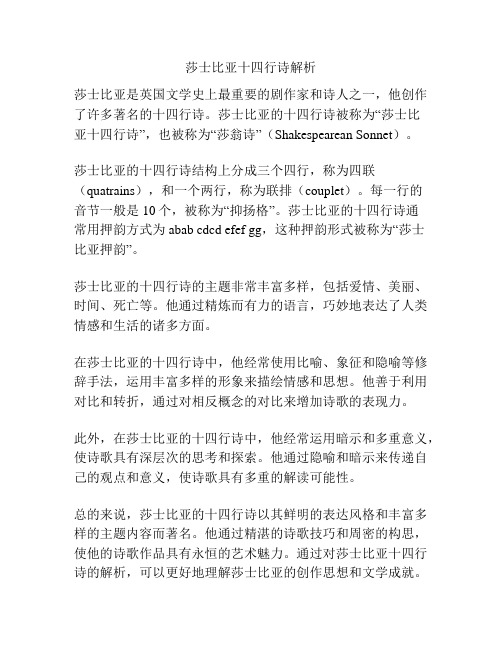
莎士比亚十四行诗解析
莎士比亚是英国文学史上最重要的剧作家和诗人之一,他创作了许多著名的十四行诗。
莎士比亚的十四行诗被称为“莎士比
亚十四行诗”,也被称为“莎翁诗”(Shakespearean Sonnet)。
莎士比亚的十四行诗结构上分成三个四行,称为四联(quatrains),和一个两行,称为联排(couplet)。
每一行的
音节一般是10个,被称为“抑扬格”。
莎士比亚的十四行诗通
常用押韵方式为abab cdcd efef gg,这种押韵形式被称为“莎士
比亚押韵”。
莎士比亚的十四行诗的主题非常丰富多样,包括爱情、美丽、时间、死亡等。
他通过精炼而有力的语言,巧妙地表达了人类情感和生活的诸多方面。
在莎士比亚的十四行诗中,他经常使用比喻、象征和隐喻等修辞手法,运用丰富多样的形象来描绘情感和思想。
他善于利用对比和转折,通过对相反概念的对比来增加诗歌的表现力。
此外,在莎士比亚的十四行诗中,他经常运用暗示和多重意义,使诗歌具有深层次的思考和探索。
他通过隐喻和暗示来传递自己的观点和意义,使诗歌具有多重的解读可能性。
总的来说,莎士比亚的十四行诗以其鲜明的表达风格和丰富多样的主题内容而著名。
他通过精湛的诗歌技巧和周密的构思,使他的诗歌作品具有永恒的艺术魅力。
通过对莎士比亚十四行诗的解析,可以更好地理解莎士比亚的创作思想和文学成就。
莎士比亚 十四行诗

莎士比亚十四行诗莎士比亚十四行诗如下:1、shakespeare sonnet 12莎士比亚十四行诗when i do count the clock that tells the time,and see the brave day sunk in hideous night;when i behold the violet past prime,and sable curls all silver'd o'er with white: when lofty trees i see barren of leaves,which erst from heat did canopy the herd,and summer's green, all girded up in sheaves,born on the bier with white and bristly beard; then of thy beauty do i question make,that thou among the wastes of time must go,since sweets and beauties do themselves forsake, and die as fast as they see others grow;and nothing 'gainst time's scythe can make defence save breed, to brave him when he takes thee hence.翻译:当我数着壁上报时的自鸣钟,见明媚的白昼坠入狰狞的夜,当我凝望着紫罗兰老了春容,青丝的卷发遍洒着皑皑白雪;当我看见参天的树枝叶尽脱,它不久前曾荫蔽喘息的牛羊;夏天的青翠一束一束地就缚,带着坚挺的白须被舁上殓床;于是我不禁为你的朱颜焦虑:终有天你要加入时光的废堆,既然美和芳菲都把自己抛弃,眼看着别人生长自己却枯萎;没什么抵挡得住时光的毒手,除了生育,当他来要把你拘走。
《莎士比亚十四行诗》中的诗歌鉴赏与情感表达

莎士比亚十四行诗的背景与特点莎士比亚(William Shakespeare)是英国文艺复兴时期最伟大的戏剧作家之一,他的创作领域广泛,包括戏剧、散文和诗歌。
莎士比亚的十四行诗(Sonnet)是他最为经典且备受赞誉的作品之一。
这些十四行诗在探讨人类心理情感,如爱情、欲望、时光流逝等方面具有深刻而独特的见解。
为何薄弱写了莎士比亚称著十四行诗?莎士比亚的十四行诗采用了英语文学中传统的抑扬格韵律体——弥尔顿体(Shakespearean Sonnet),由三个四行节(Quatrain)和一个两行节(Couplet)构成。
每个节都包含了10个音节,并遵循特定地韵律模式。
通过这种形式化结构,莎士比亚成功地表达了人类情感世界中各种复杂而深邃的主题。
蕴涵于十四行诗中的情感表达在莎士比亚的十四行诗中,情感表达起到了重要的作用。
他通过独特的语言和形象描写,将爱情、欲望、失败和时光流逝等抽象概念转化为具体的形象,使读者能够更加深入地理解和感受其中所蕴含的情感。
爱情与欲望莎士比亚的十四行诗中经常探讨爱情和欲望这两个永恒的主题。
他以独特而细腻的方式描绘了爱情的美好、复杂性和矛盾之处。
同时,他也包含对欲望带来的冲动、挣扎和后果进行深入思考。
失败与遗憾莎士比亚在一些十四行诗中探讨了人类经历失败和遗憾时所面临的情感反应。
无论是由于自身原因还是外部环境造成,失败都是人生不可避免地一部分。
在这些诗歌中,莎士比亚传达了对逆境下坚持自我的重要性以及如何从失意中重新寻找勇气与希望。
时光流逝与死亡莎士比亚的十四行诗中也不乏对时光流逝和死亡的思考。
他认识到时间无情地流逝,人类终将面临死亡。
这些思考表达了对生命短暂性的深切感受,鼓励读者珍惜当下并追求真正的幸福。
结语莎士比亚的十四行诗是文学史上的经典之作,在情感表达和艺术形式方面都具有显著特点。
通过这些诗歌,我们可以更深入地了解人类心理与情感反应,并从中汲取智慧和灵感。
无论过去还是现在,莎士比亚十四行诗仍然被广泛阅读和赞美,它们将永远留下来为我们提供启示与慰藉。
何威廉诗词
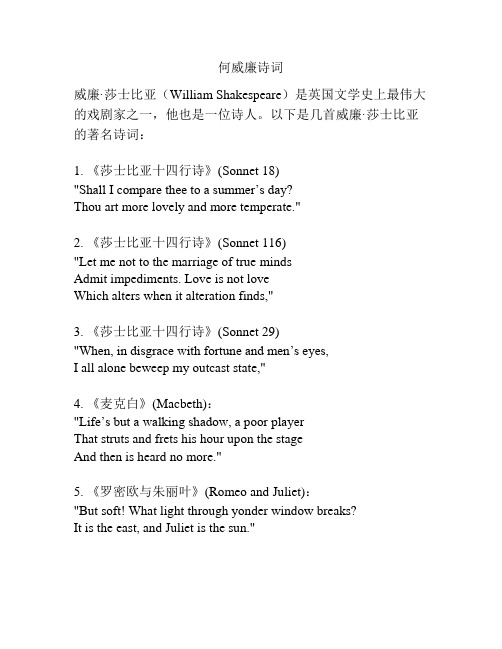
何威廉诗词威廉·莎士比亚(William Shakespeare)是英国文学史上最伟大的戏剧家之一,他也是一位诗人。
以下是几首威廉·莎士比亚的著名诗词:1. 《莎士比亚十四行诗》(Sonnet 18)"Shall I compare thee to a summer’s day?Thou art more lovely and more temperate."2. 《莎士比亚十四行诗》(Sonnet 116)"Let me not to the marriage of true mindsAdmit impediments. Love is not loveWhich alters when it alteration finds,"3. 《莎士比亚十四行诗》(Sonnet 29)"When, in disgrace with fortune and men’s eyes,I all alone beweep my outcast state,"4. 《麦克白》(Macbeth):"Life’s but a walking shadow, a poor playe rThat struts and frets his hour upon the stageAnd then is heard no more."5. 《罗密欧与朱丽叶》(Romeo and Juliet):"But soft! What light through yonder window breaks?It is the east, and Juliet is the sun."这些诗词展示了威廉·莎士比亚丰富的才华和他对人生、爱情以及人性的深刻洞察力。
- 1、下载文档前请自行甄别文档内容的完整性,平台不提供额外的编辑、内容补充、找答案等附加服务。
- 2、"仅部分预览"的文档,不可在线预览部分如存在完整性等问题,可反馈申请退款(可完整预览的文档不适用该条件!)。
- 3、如文档侵犯您的权益,请联系客服反馈,我们会尽快为您处理(人工客服工作时间:9:00-18:30)。
A
2
艾汶河上斯特拉斯福:莎翁故居及塑像
A
3
莎翁部分作品:Some Works
A
4
Poems
• Poems: • I narrative: ballad, epic • II dramatic: dramatic monologue • III lyric (dealing with emotions, feelings): sonnet, ode,
The latter Shakespearean sonnets are addressed to a 'dark lady' of ill repute
A
14
Reading Structure to Theme
• Structure: the form of a work. • Theme: the subject of a work. • A good use of structure in a small literary form like a
sonnet can enhance or emphasize the progress of the theme. • When reading Shakespeare’ s sonnets, relate structure to theme. • Shakespeare builds on or varies his theme – his main concern – from quatrain to quatrain, using the couplet to deliver a dramatic concluding statement.
A
6
End Rhyme
• Rhyme (rime ): the correspondence of two or more words with similar-sounding final syllables placed so as to echo one another.
• masculine rhyme, in which two words end with the same vowel– consonant combination. wife life
有时候苍天的巨眼照得太灼热, 他那金彩的脸色也会被遮暗; 每一样美呀,总会离开美而凋落, 被时机或者自然的代谢所摧残;
A
19
Quatrain 2:
• Sometimes the sun of summer is too hot, and at other times the summer sun’s golden face will be dimmed by clouds. Every fair in nature becomes less and less with time passing by. The chance accidents, good or ill, or the changing process of nature will strip of its beauty.
A
18
• Quatrain 2: The sun is sometimes too hot in summer or occasionally shaded. Every beautiful thing becomes less beautiful through chance or time.
Sometime too hot the eye of heaven shines, And often is his gold complexion dimmed, And every fair from fair sometime declines, By chance, or nature's changing course, untrimmed:
• Quatrain 3 E But thy eternal summer shall not FADE, F Nor lose possession of that fair thou OWEST;. E Nor shall Death brag thou wander'st in his SHADE, F When in eternal lines to time thou GROWEST:.
A
9
An iamb is a metrical foot consisting of an unaccented syllable U
followed by an accented syllable / (i.e. A “soft” beat followed by a “loud” beat).
After third person in present tense: (e) th hath
Omitting of syllables
A
13
Shakespeare’s sonnets
William Shakespeare wrote 154 sonnets.
the first 126 Shakespearean sonnets to a handsome young man
• Quatrain 2 C Sometime too hot the eye of heaven SHINES,. D And often is his gold complexion DIMM'D;. C And every fair from fair sometime deCLINES, D By chance or nature's changing course unTRIMM'D;.
A
15
Rhyme Scheme of Sonnet 18
• Quatrain 1 A Shall I compare thee to a summer's DAY? B Thou art more lovely and more temperATE: A Rough winds do shake the darling buds of MAY,, B And summer's lease hath all too short a DATE:
• Eye rhyme syllables are identical in spelling
but are pronounced differently (cough / plough)
A
8
meter
Iambic pentameter consists of
• five measures, units, or meters, of • iambs
• The rhyme scheme is as follows: First stanza (quatrain): ABAB; Second stanza (quatrain): CDCD; Third stanza (quatrain): EFEF; Couplet: GG.
A
12
Early Modern English Grammar
U/ a gain
U /U/ im mor tal ize
A
10
Iambic pentameter
1
2
3
4
5
U /U / U / U / U / • One day I wrote her name u pon the strand,
U / U / U / U/U / • But came the waves and wash ed it a way:
能不能让我来把你比作夏日? 你可是更加可爱,更加温婉; 狂风会吹落五月里开的好花儿, 夏季租出的日子又未免太短暂:
A
17
Paraphrasing:
• Quatrain 1: Shall I compare you to a day in summer that is very beautiful here in England? Yet this comparison is not sufficient, because you are more beautiful and less extreme than the summer. The winds of summer are rough on the budding life, and the duration of summer usually does not last very long.
OE 449—1150 ME 1150--- 1500 EME 1500---1700 ME 1700--
Grammar: Thee
you as an object
Thou( pl. ye) you as a subject thou art
Thy ( thine) your possessive form of thou
• Couplet G So long as men can breathe or eyes can SEE, G So long lives this and this gives life to THEE.
A
16
• Quatrain 1: Extravagant praise compares a summer day as less lovely and constant as the beloved.
pastoral , elegy
A
5
A sonnet is
• a lyric poem • consisting of fourteen lines • written in iambic pentameter • with a definite rime scheme • and a definite thought structure
